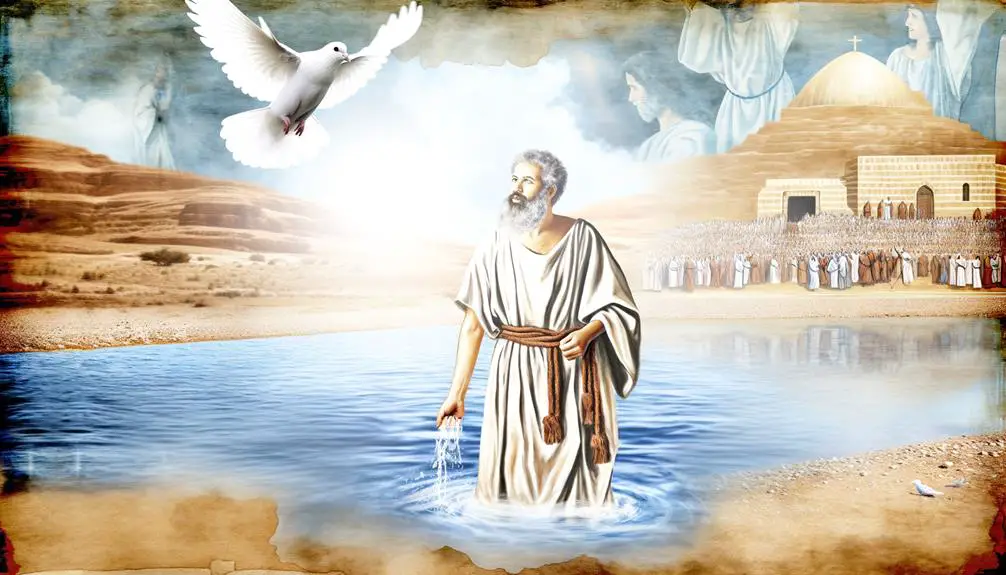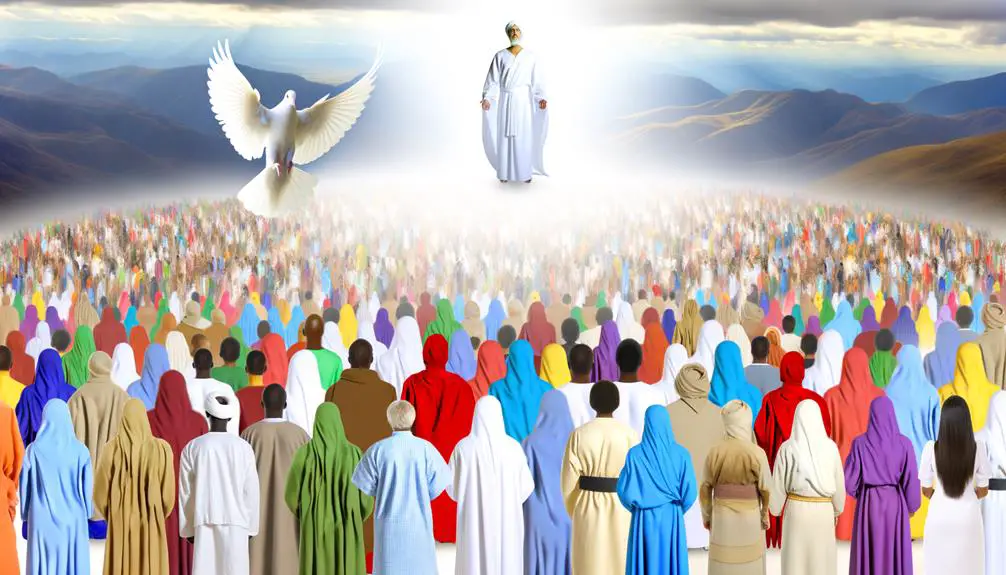Uncover the ancient wisdom of purging in the Bible, a journey to spiritual cleanliness that promises to transform the modern soul.
Purge in the Bible
Navigating the concept of purging in the Bible is akin to unlocking a treasure chest filled with ancient wisdom and divine mandates. You'll find that throughout its pages, from the intricate purification rituals in Leviticus to the profound calls for moral and spiritual cleanliness in the teachings of Jesus, the Bible weaves a complex tapestry of purification.
This journey through scripture reveals not just historical or religious practices, but a deeply rooted divine command for purity that resonates through the ages. As you explore, consider how these ancient texts might still speak to the modern soul, urging a purge of the heart in ways that are both challenging and transformative.
Key Takeaways
- Purging in the Bible encompasses physical, cultural, and spiritual renewal through rituals and military conquests.
- Sacred offerings in rituals, symbolizing surrender and provision, were central to purification practices.
- Prophetic calls emphasized repentance, ethical living, and transformation as paths to communal and spiritual renewal.
- Acknowledgment of sin and divine intervention were seen as crucial steps toward personal and communal purification.
Historical Context of Purging

To understand the concept of purging in the Bible, it's essential to explore its historical context, rooted deeply in ancient rituals and societal norms. You'll find that this notion isn't merely a spiritual or religious directive but is intertwined with the very fabric of societal and political life in ancient times. The act of purging, within this framework, often extended beyond spiritual cleansing to encompass physical and societal transformations, frequently following military conquests.
When you delve into the historical backdrop of these ancient civilizations, you'll notice that military conquests weren't just about expanding territories or subjugating peoples. They were deeply ritualistic endeavors that aimed at purifying the conquered lands and populations. This purification process, or purging, was believed to be necessary to erase the previous identity, beliefs, and social structures of the vanquished, thereby integrating them into the victor's domain both physically and spiritually.
Archaeological evidence supports this interpretation, offering tangible proof of these practices. Excavations in ancient Near Eastern sites have unearthed artifacts that suggest ritualistic activities were carried out in the aftermath of conquests. These findings include ceremonial objects, inscriptions, and even architectural modifications made to existing religious sites, all indicative of efforts to purify or purge the conquered spaces and communities.
In this context, the biblical references to purging can be seen not just as spiritual injunctions but as reflections of a broader, multifaceted process involving physical, cultural, and religious transformation. This understanding underscores the complexity of ancient societies, where the spiritual and the temporal were inextricably linked, and purging served as a means to redefine and reshape both individual and collective identities.
Purification Rituals in Leviticus

You'll find that Leviticus meticulously details ritual cleansing practices and the significance of sacred offerings, setting a foundational framework for purity in ancient religious observances.
These protocols not only served to maintain physical cleanliness but also symbolized deeper spiritual renewal and reconciliation with the divine.
Through analyzing these ancient texts, you gain insight into the complex interplay between ritual purity and community cohesion in early Judaic traditions.
Ritual Cleansing Practices
In the Book of Leviticus, purification rituals play a crucial role in maintaining both individual and communal holiness, delineating a series of complex ceremonies designed to cleanse persons and objects from impurity. These practices, rich in symbolic meanings, parallel modern hygiene while imbuing actions with spiritual significance.
Aspect |
Purpose |
Modern Parallel |
|---|---|---|
Water Immersion |
To remove physical and spiritual impurities |
Bathing |
Sacrificial Offerings |
Symbolize the transfer of impurity from the individual to the offering |
Symbolic gestures |
Anointing with Oil |
Consecrates and prepares for a holy purpose |
Using antiseptics |
Sprinkling Blood |
Reaffirms the covenant between God and His people |
Signing contracts |
These rituals underscore the intertwining of physical cleanliness and spiritual purity, guiding adherents in their pursuit of holiness.
Sacred Offerings Explained
Exploring the Levitical code further, we find that sacred offerings stand as central elements in the purification rituals, serving not only to cleanse but also to bridge the gap between the divine and the human.
Offering types vary significantly, each with distinct sacrificial significance, intricately woven into the fabric of ancient Israelite worship. Burnt offerings, for example, signify total surrender to God, while grain offerings represent acknowledgment of His provision. The sin and guilt offerings, crucial for purification, underscore the seriousness of transgressions and the necessity of atonement.
These offerings, meticulously outlined in Leviticus, encapsulate a comprehensive system designed to restore holiness. Their complexity and variety highlight the profound understanding of sin, redemption, and the pursuit of divine purity in ancient Israelite society.
Prophetic Calls for Repentance

Throughout the Bible, numerous prophets issued calls for repentance, urging communities and individuals alike to return to righteous paths and forsake their wrongful ways. These appeals weren't merely about turning away from sin but were deeply rooted in a covenantal framework, where fidelity to divine laws was paramount. The ethical implications of these calls are profound, as they underscore the responsibility of individuals and societies to pursue justice, mercy, and humility.
Modern parallels to these prophetic messages are striking. Today, voices across various platforms call for societal repentance in the face of injustice, environmental degradation, and moral decay, echoing the Biblical prophets' insistence on ethical living and communal accountability. These contemporary calls for repentance challenge us to examine our actions and their impacts on others and the planet, urging a collective return to principles of equity and stewardship.
The analytical depth of these Biblical narratives reveals a sophisticated understanding of human nature and societal dynamics. Prophets like Isaiah and Jeremiah didn't just condemn wrongdoing; they offered a vision of renewal and restoration, predicated on sincere repentance and ethical transformation. This dual focus on accountability and hope is a powerful framework for understanding both the challenges and potentials of human communities.
Purging Sin in Psalms

Delving into the Psalms, we find a nuanced portrayal of sin's purging as both a personal and communal imperative, demanding introspection and reformation. The Psalms, a rich tapestry of emotive poetry, articulate a deep longing for Divine Forgiveness and Heart Transformation. This ancient text reveals the complexity of human frailty juxtaposed with the divine nature of forgiveness and the transformative power of seeking purity.
- Acknowledgment of Sin: Psalms teach that acknowledgment of one's sins is the first step towards purification. Without recognizing our own failings, we can't hope to be transformed.
- Divine Intervention: The plea for Divine Forgiveness is central, illustrating a belief in a higher power's ability to cleanse and renew.
- Heart Transformation: True purging of sin isn't merely about external acts of penance; it necessitates a profound change of heart, a theme recurrent in the Psalms.
- Communal Responsibility: While much of the focus is on personal transformation, there's also an understanding that communities must seek purification together, reflecting on collective sins.
- The Role of Prayer: Prayer is depicted as a vital tool in the process of seeking forgiveness and purging sin, serving as a conduit for expressing repentance and a desire for renewal.
In essence, the Psalms provide a framework for understanding the process of sin's purging as an intricate blend of personal accountability, divine mercy, and the quest for a transformed heart. Through this lens, we grasp the depth of the Psalmists' yearnings not just for themselves, but for their community, highlighting the interconnectedness of individual and collective spiritual health.
John the Baptist's Message

John the Baptist's message, centering on repentance and the coming kingdom of Heaven, marks a pivotal shift in biblical narrative towards redemption and moral accountability. His ministry, deeply rooted in the Judaic tradition of ceremonial cleansing, introduced a radical form of purification through desert baptisms. This act wasn't merely a physical cleansing but symbolized a profound spiritual renewal. You'll find that these baptisms in the wilderness weren't only a call to personal repentance but also served as a critical precursor to the arrival of Jesus Christ, emphasizing the need for internal transformation in preparation for the new covenant.
The symbolism of repentance in John's teachings is multifaceted. It's not just about turning away from sin; it's a complete reorientation of one's life towards God. This message resonated deeply with those feeling lost in the spiritual desert of their lives, yearning for a fresh start and a deeper connection with the divine. John's insistence on repentance and moral rectitude was a clarion call to those burdened by the weight of their transgressions, offering a path to purification and spiritual renewal.
John's role as the forerunner of Christ highlights the importance of his message in the broader biblical context. His emphasis on repentance and the symbolism of desert baptisms underscore the transformative power of faith and the enduring hope for redemption. Through his teachings, John the Baptist not only prepared the way for Jesus but also set the stage for a new paradigm of spiritual purity and moral accountability.
Jesus' Teachings on Purity

Jesus' teachings on purity, extending beyond mere external observances, challenge you to consider the profound implications of internal spiritual cleanliness. He emphasized that true purity isn't just about adhering to rituals or maintaining appearances; it's about a deep, heart transformation that influences your entire life. This shift from external to internal focus was revolutionary, underscoring the essence of moral living according to the principles of love, mercy, and humility.
- *Heart transformation*: Jesus taught that purity begins within the heart. He argued that evil thoughts, malice, and deceit originate from the heart, making internal purity paramount.
- *Moral living*: Moral integrity and ethical conduct are central to Jesus' teachings on purity. He advocated for a life lived in accordance with divine principles, highlighting honesty, compassion, and justice.
- *Love and mercy*: Emphasizing love and mercy over ritual observance, Jesus pointed out that true purity is demonstrated through love for one another, including showing mercy to those in need.
- *Humility*: Jesus placed a strong emphasis on humility as a component of purity, teaching that the humble in heart are closer to the kingdom of God.
- *Internal vs. External*: He consistently challenged the Pharisees' focus on external rituals, advocating instead for a purity that emanates from a transformed heart and mind.
In essence, Jesus' teachings on purity invite you to undergo a profound internal transformation, prioritizing heart and mind over outward appearances. This approach to purity not only fosters moral living but also cultivates a deeper, more authentic relationship with the divine.
The Final Purge in Revelation

As you explore the concept of the Final Purge in Revelation, it's crucial to understand the imagery of Judgement Day and its role as humanity's ultimate test. This segment weaves a complex narrative that scrutinizes moral and spiritual readiness against an apocalyptic backdrop.
Analyzing these themes provides deep insights into the biblical perspective on purification and the end of times.
Judgement Day Imagery
The Book of Revelation paints a vivid picture of the final judgment day, depicting it as a profound purge of cosmic proportions. This apocalyptic tome, steeped in Armageddon symbolism, unfolds a series of visions that serve as a culminating point for divine justice and the purification of creation. The imagery used is both intricate and symbolic, drawing from a rich tapestry of prophetic traditions and apocalyptic visions.
- Fiery descent: Heavenly bodies falling, signifying the collapse of the old order.
- Divine warriors: Celestial beings executing judgment, embodying righteousness and wrath.
- Seas turning to blood: Representing the profound upheaval and the purging of corruption.
- Darkened skies: Symbolizing the overshadowing of human dominion by divine authority.
- The great white throne: Denoting the ultimate seat of judgment, from which no soul is exempt.
Humanity's Ultimate Test
Building on the vivid imagery of judgement depicted in Revelation, humanity's ultimate test emerges in the narrative as the final purge, a decisive moment where individuals face the culmination of divine scrutiny. This phase is rife with ethical dilemmas, compelling you to navigate a complex moral landscape. The choices made here aren't merely about survival strategies; they're reflections of character and faith tested under extreme pressure.
You're drawn into a scenario where every action and decision echoes into eternity, challenging not just your physical endurance but, more critically, your moral and spiritual integrity. The final purge doesn't just seek to separate the wheat from the chaff; it intricately examines the decisions you make when faced with the ultimate test of faith and morality.
Frequently Asked Questions
How Has the Concept of Purging Evolved in Different Translations of the Bible Over the Centuries?
When you delve into how the concept of purging has evolved across different Bible translations, you're navigating a complex landscape shaped by translation methodologies and textual variances.
Over centuries, scholars have grappled with these variances, impacting the interpretation and understanding of purging. Each translation methodology brings its lens, subtly shifting meanings and nuances.
This evolution reflects the ongoing scholarly endeavor to bridge historical contexts and linguistic evolutions, ensuring the text's relevance and accuracy.
Are There Any Cultures Outside of the Biblical Context That Have Similar Practices or Beliefs in Purging, and How Do They Compare?
You're diving into a fascinating exploration of purification rituals across cultures, revealing striking cultural parallels. These practices, distinct yet interconnected, offer a rich tapestry of beliefs in cleansing and renewal.
Analyzing these rituals sheds light on humanity's universal quest for purity. From Native American smoke ceremonies to Japanese Misogi, each tradition mirrors a deep, shared longing for spiritual renewal, echoing themes you might find familiar, yet they stand uniquely across time and geography.
How Do Modern Christian Denominations Interpret and Practice the Concept of Purging Differently Today?
You'll find that modern Christian denominations interpret and practice purging with considerable differences, reflecting their unique theological perspectives.
These denominational differences are often rooted in how they perceive purge symbolism, with some viewing it as a metaphor for personal or communal cleansing, while others may take a more literal approach.
This diversity in interpretation leads to varied practices, from symbolic acts in liturgy to personal acts of confession or penance, showcasing the rich tapestry of Christian thought.
What Psychological Impacts Can the Notion of Purging, as Discussed in the Bible, Have on Believers and Non-Believers Alike?
Imagine you're sifting through old memories, deciding which to keep and which to discard. This process can significantly impact your mental health.
Similarly, the concept of purging can affect both believers and non-believers, potentially shaping emotional resilience and influencing coping mechanisms.
For believers, it might reinforce a pathway to spiritual cleansing, whereas, for non-believers, it could underscore philosophical introspection or resilience against existential dilemmas, affecting their psychological landscape in profound ways.
Can the Practice of Purging in the Bible Be Linked to Any Contemporary Environmental or Social Purification Movements?
You might wonder if the concept of purging has ties to modern environmental activism or social justice movements.
Indeed, the idea of cleansing or renewal parallels efforts in these areas. Activists often frame their work as purging society of injustices or the environment of pollution. This metaphorical use of 'purging' lends a sense of moral urgency and righteousness to campaigns for change, echoing ancient practices of purification in a contemporary context.
Conclusion
In essence, your journey through biblical purging illuminates a path from ancient rituals to the heart of divine redemption.
Like a potter meticulously shaping clay, these narratives mold our understanding of spiritual cleanliness.
The scriptures, from Leviticus to Revelation, weave a tapestry of repentance, purification, and ultimately, a final reckoning.
This exploration not only uncovers the layers of historical and theological significance but also invites a profound reflection on the essence of purity in one's own life.



Sign up